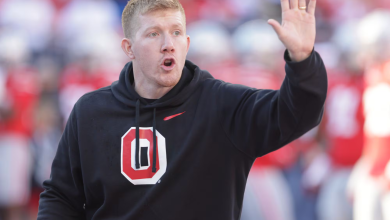The assistant coach for basketball at Auburn argues for a higher overall seed than Duke.

In the world of college basketball, seeding in the NCAA Tournament is a topic that garners endless debate each season. Teams, coaches, players, and fans all have their eyes on the coveted top seeds, which can significantly impact a team’s path to the national championship. This year, as the tournament approaches, Auburn Tigers basketball assistant coach Johnnie Harris has made headlines by publicly arguing that his team deserves a higher overall seed than the powerhouse Duke Blue Devils. In a sport where reputations often precede actual performance, Harris’s remarks challenge the conventional wisdom surrounding team rankings and seeding, and they’ve sparked an interesting discussion about the criteria used by the selection committee, the strength of different conferences, and the evolving landscape of college basketball.
This article will explore the reasons behind Harris’s argument, evaluate the comparative merits of Auburn and Duke’s respective resumes, and assess what this debate reveals about the seeding process in NCAA basketball.
The NCAA Tournament Seeding Process: Understanding the System
Before diving into the specifics of Auburn and Duke’s respective arguments for seeding, it’s important to first understand how the NCAA Tournament seeding process works. The selection committee is tasked with evaluating teams based on several factors, including:
- Overall Record: This includes the number of wins and losses, with weight often placed on quality wins and strength of schedule.
- Conference Performance: Teams in strong conferences generally get more favorable seeding, though individual performance often carries significant weight.
- Key Wins and Losses: Signature victories against ranked opponents and competitive losses against tough teams can enhance a team’s resume.
- Net Rating: The NCAA’s NCAA Evaluation Tool (NET) provides a quantitative evaluation of team performance.
- Injury Reports and Player Availability: The health of a team’s key players, especially near the end of the season, can also influence their seeding.
The selection committee weighs these factors, alongside subjective elements like team strength, to determine which teams deserve the top spots. Given these varied criteria, debates about seeding are frequent and often passionate, as teams like Auburn and Duke with their different styles and paths to the tournament come under scrutiny.
Auburn’s Case: The Case for a Higher Seed
Auburn’s basketball program has experienced a steady rise in recent years under head coach Bruce Pearl. The Tigers have become a perennial contender in the SEC (Southeastern Conference) and have established themselves as one of the toughest teams in the nation. Auburn’s competitive success has been especially evident this season, as the team’s performance has consistently demonstrated its capability against top-tier competition.
- Strong Conference Play: The SEC is widely regarded as one of the most competitive conferences in college basketball, and Auburn has been at the forefront of this. With the likes of Alabama, Kentucky, and Tennessee also vying for high seeds, Auburn’s victories over these teams have only strengthened their case. The Tigers have earned critical wins within their conference, showcasing their ability to compete with the best in college basketball.
- Key Wins: Auburn has been a team that has defeated top-ranked opponents, further adding to its argument for a higher seed. The Tigers secured notable wins over Alabama, one of the nation’s best teams, as well as Kentucky and Arkansas. These victories are hard to ignore when considering Auburn’s qualifications for a higher seeding.
- NET Rating and Metrics: According to the NET rankings, Auburn has performed at a high level all season long. The Tigers’ efficiency on both ends of the floor, especially defensively, places them near the top of the nation in several key statistical categories. Auburn’s offensive efficiency, combined with their elite defense, makes them a dangerous team capable of advancing deep into the tournament.
- Player Development and Depth: Auburn’s success has been driven not just by star players but by a well-rounded team. Players like Jaylin Williams, Wendell Green Jr., and K.D. Johnson have been integral to Auburn’s success this season. The team has shown that it can win with both offense and defense, proving that they are not a one-dimensional team. This depth and versatility make them more than capable of competing with, and potentially defeating, any top-seeded team in the tournament.
In arguing for a higher seed, Harris likely pointed to Auburn’s consistency, the competitive nature of the SEC, and the overall balance of the Tigers’ team. A higher seed would reflect the recognition of these accomplishments, and Harris feels that Auburn deserves that recognition.
Duke’s Case: Why They Should Remain Highly Seeded
On the other hand, Duke University is a basketball program that requires little introduction. The Blue Devils have consistently been one of the top teams in college basketball under legendary coach Mike Krzyzewski and, now, under his successor Jon Scheyer. Duke’s stature in the NCAA Tournament is undeniable, and despite challenges this season, they remain a favorite for many.
- Legacy and Brand: Duke’s rich basketball legacy plays a significant role in its seeding. The Blue Devils have been a dominant force in college basketball for decades, with several national championships and countless appearances in the NCAA Tournament. This pedigree often influences the selection committee’s decisions, as Duke’s historical success is considered a major factor in the overall evaluation.
- High-Profile Wins: While Auburn has seen great success in the SEC, Duke has been competitive in the ACC (Atlantic Coast Conference), a league that also consistently ranks among the top conferences in college basketball. Duke has earned quality wins over North Carolina, Virginia, and Miami. Although the Blue Devils have had some struggles this season, these victories still bolster their resume when it comes to seeding.
- Star Power and Freshmen Talent: One of the main reasons for Duke’s continued success is the program’s ability to recruit top-tier talent year after year. This season, Duke has been led by Kyle Filipowski, a standout forward and one of the nation’s top freshmen. Filipowski, along with others like Tyrese Proctor and Mark Mitchell, has helped Duke remain competitive despite challenges early in the season. The ability to reload with elite talent has kept Duke in the conversation for a high seed in the NCAA Tournament.
- Coaching: Even with a coaching transition, Duke remains in the conversation for top seedings because of the pedigree of its coaching staff. Coach Jon Scheyer has continued the program’s tradition of success, blending new talent with the established culture that Krzyzewski cultivated. The leadership and experience on the coaching staff are valuable assets when it comes to tournament time.
While Auburn has made a compelling case for a higher seed, it’s important to consider the context of Duke’s overall strength and the team’s ability to compete at the highest levels. The Blue Devils’ continued prominence in the tournament picture often leads to them being seeded high, but the committee needs to evaluate whether they are truly deserving of one of the very top spots this season.
The Debate: Auburn vs. Duke
The rivalry between Auburn and Duke, particularly in the conversation about tournament seeding, comes down to differing styles of basketball and the weight placed on conference strength. Auburn has been a powerhouse in the SEC this season and has delivered consistent performances, showcasing strong defense, depth, and big wins. However, Duke’s brand, historical significance, and high-profile victories cannot be ignored.
Auburn has a compelling argument: their strength in conference play, top-tier wins, and overall balanced team should earn them a higher seed than they currently anticipate. Duke, however, still carries the weight of its brand and impressive talent, which is why it remains in the upper tier of tournament teams.
The selection committee will need to balance these factors. While Auburn’s season may be statistically stronger in some categories, Duke’s historical relevance, star power, and competitive pedigree make them an enticing team for a high seed. Ultimately, the debate between these two programs highlights the complex nature of NCAA Tournament seeding and the subjective nature of the selection committee’s decisions.









